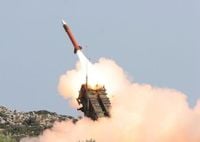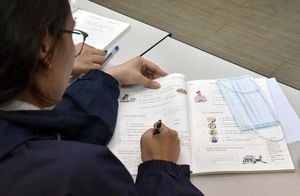New German Chancellor Friedrich Merz made headlines during his visit to Kyiv on May 10, 2025, announcing a significant policy shift regarding military aid to Ukraine. In a move that has sparked considerable debate, Merz declared that Germany would no longer publish detailed information about its military assistance to Ukraine, citing the need for operational security as a priority over transparency.
Merz, who took office just four days prior on May 6, 2025, emphasized that while public interest in military aid is valid, the situation demands a level of secrecy to prevent Russia from gaining tactical advantages. "Under my leadership, the debate about arms deliveries, calibers, weapons systems and so on will be taken out of the public eye," he stated during a press conference, as reported by Reuters.
The policy change comes amid ongoing discussions in Europe regarding military support for Ukraine, particularly the potential supply of Taurus long-range cruise missiles. Merz, however, refrained from confirming or denying whether these missiles would be sent to Ukraine, adhering to the new policy of strategic ambiguity. He assured that Germany remains committed to supporting Ukraine militarily, stating, "We support Ukraine militarily to the extent that we can and bear responsibility for it. And we are doing this in order to put an end to this war," according to TVP.
In conjunction with Merz's visit, the United States approved the transfer of 125 long-range artillery rockets and 100 Patriot air defense missiles from Germany to Ukraine. This decision, reported by the New York Times on May 10, underscores the ongoing military collaboration between the U.S. and its European allies in response to the Russian invasion of Ukraine.
The U.S. congressional official who announced the approval on May 9 indicated that Washington had given the green light for Germany to send these weapons to Kyiv, highlighting the critical nature of this support. The shipment includes advanced military technology that Ukraine desperately needs as it faces increasing attacks from Russian forces.
Currently, Ukraine reportedly has only eight Patriot systems, two of which are not operational. An additional Patriot system is on its way from Israel, as part of a previous commitment made on May 4, 2025. Ukrainian aviation expert Kostiantyn Kryvolap explained that at least two Patriot missiles are required to intercept a single ballistic missile, illustrating the urgency of the situation as Russia escalates its attacks.
As Merz reaffirmed Germany's commitment to aiding Ukraine, he urged other European nations to bolster their support as well. "Germany will continue to expand its financial support. I am counting on you (...) to do the same with us," he said, addressing his counterparts during the visit.
Meanwhile, the geopolitical landscape continues to evolve. Russian President Vladimir Putin has extended an invitation for direct talks with Ukraine, proposing to hold negotiations in Istanbul starting May 15, 2025. This development comes as the Kremlin expressed support for international cooperation in peace negotiations, with Turkish President Recep Tayyip Erdoğan indicating Turkey's readiness to assist in organizing these discussions.
On May 11, 2025, just hours after Merz's visit, Russian forces launched a significant assault, deploying 108 Shahed-type attack drones and decoy UAVs against Ukrainian targets. The timing of this attack raises concerns about the ongoing volatility in the region and the effectiveness of diplomatic efforts.
The U.S. State Department has called for concrete proposals from both sides to facilitate peace negotiations, highlighting the complexity of the situation. Tammy Bruce, a spokesperson for the department, emphasized the need for clear communication between the involved parties. "If they speak to each other in Russian, he doesn't know what they are saying," a Western official remarked, pointing to the challenges in ensuring effective dialogue.
Former U.S. ambassador to Russia, Michael McFaul, criticized some approaches to the situation, labeling them as misguided. He advocated for tougher sanctions targeting Russia's banking and energy sectors, particularly its fossil fuel industry, as a means to exert pressure on the Kremlin.
As the situation unfolds, the leaders of Ukraine, the U.K., France, Germany, and Poland issued a joint statement advocating for increased military support and tougher sanctions against Russia. This unified stance reflects a growing consensus among European nations regarding the need for a robust response to the ongoing conflict.
The escalation of violence in Ukraine has led to a humanitarian crisis, with civilians bearing the brunt of the conflict. Reports indicate that April 2025 was the deadliest month for Ukrainian civilians since September 2024, underscoring the urgent need for international intervention and support.
As discussions about military aid and peace negotiations continue, the situation in Ukraine remains precarious. The commitment of Germany and other European nations to support Ukraine is crucial, but the path to peace is fraught with challenges. With the specter of continued violence looming, the world watches closely as leaders navigate this complex and evolving conflict.
In summary, the recent developments signal a pivotal moment in the ongoing conflict in Ukraine, with Germany's new policies and the U.S. military support playing significant roles in shaping the future of the region. As diplomatic efforts intensify, the hope remains that a peaceful resolution can be achieved, but the road ahead is uncertain.




